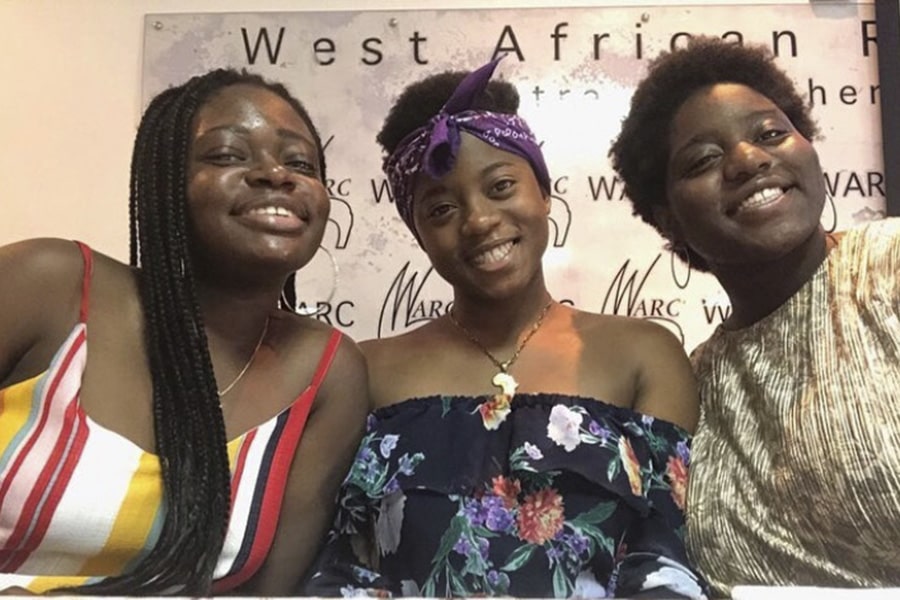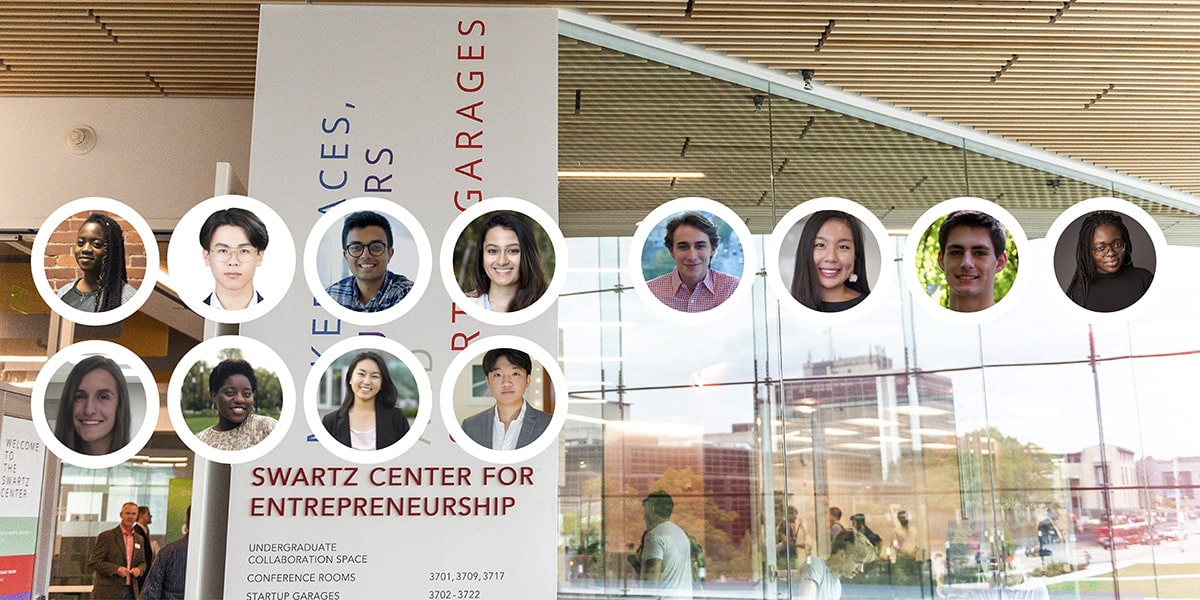
Innovation Scholars Prepare To Forge New Paths
Swartz Center program cultivates entrepreneurial students
During past Orientation weeks at Carnegie Mellon University, incoming students have the chance to meet and connect through activities like Playfair, House Wars and the Craig Street Crawl. As Awa Ndiaye got to know her new classmates during her first week at CMU, she recruited seven that were African or African-American and created Zodaj, a startup geared toward improving standards of living in Africa.
Two years later, three of the founding members of Zodaj — Ndiaye, Dominique Aruede, and Akwellé (Q) Quaye — are among the newly named Swartz Center for Entrepreneurship 2022 Innovation Scholars. The program, started in 2012 with funding from a grant from the McCune Foundation, cultivates an entrepreneurial mindset among undergraduate students over two years
Ndiaye, a double major in business administration and Chinese studies, came to CMU with an entrepreneurial drive. Originally from Senegal, both her parents worked for the United Nations, and her education was always formed around global studies.
As CEO of Zodaj, Ndiaye has worked on projects in education-technology, like a game-based app that teaches career readiness, English and math. Zodaj also works with agricultural-technology, helping farmers make sustainable decisions that increase yield. Zodaj also has a non-profit branch.
While Zodaj uses Senegal as the pilot country for all of its programs, Ndiaye has big plans for the startup.
"I hope to become a multinational company," Ndiaye said. "I really want to impact the developing world in general. While our focus is in Africa, I do think a lot of the solutions we create can be scaled beyond the African continent to impact people's lives."
Q Quaye, the Head of Operations for the Zodaj Foundation and a junior majoring in statistics, points out that while the first two years of working on the startup were rewarding, it was challenging to independently figure out how best to build Zodaj.
"I feel like being Innovation Scholars will really help us," Quaye said. "This is a chance to broaden our network and find new people to learn and grow from. These new opportunities will be really beneficial as a company."

Learn more about the Innovation Scholars program and the 2020 cohort here.
Dave Mawhinney, executive director for the Swartz Center for Entrepreneurship, extols the transformational nature of the Innovation Scholars program. The two-year opportunity gives rising juniors access to mentoring from experienced entrepreneurs and investors; travel stipends for a trip to Silicon Valley to meet with venture capital firms and startups while participating in networking events with alumni; $6,000 stipends if the scholar has their own startup; and access to a pool of students with a like-minded entrepreneurial mentality.
"Not everybody can be an entrepreneur or wants to be an entrepreneur," said Mawhinney. "There are some students who have the desire to be the lead, to take that risk — to jump into the ocean when they're not sure how to swim. It's those who do that change the world."
Mawhinney and Sonya Ford, the program manager for the Innovation Scholars, work to recruit students from across all of CMU's colleges, including at least one from the College of Fine Arts each year.
Sachi Shah is a rising senior with a self-defined major called leadership in creative enterprise that combines her passion for entrepreneurship, fine arts and design. She is a 2021 Innovation Scholar, and set to spend next semester doing an internship at Deserve, a credit-card startup based in Silicon Valley whose CEO Kalpesh Kapadia is a CMU alumnus. Deserve was one of the companies Shah visited on her Innovation Scholars trip to Silicon Valley.
"In the world of startups, we always talk about unicorns, which are billion-dollar ideas that are waiting to be discovered," Shah said. "I feel like the Swartz Center is the unicorn of CMU because it's this amazing resource and community of people."
Great visit with @teppercmu @TepperAlumni alumnus Kalpesh Kapadia, founder of @DeserveCards today. Thank you Kalpesh! #2020BayAreaTrek pic.twitter.com/kMxg2lRaHK
— CMU Swartz Center (@CMUSwartzCenter) January 9, 2020
Check out the spot 90.5 WESA did on DeltaTrainer today! Local startup @DeltaTrainer is using artificial intelligence to make personal training more accessible https://t.co/Mc8NpMlTt0
— CMU Swartz Center (@CMUSwartzCenter) March 2, 2020
Matt Spettel, the CEO of DeltaTrainer, was an Innovation Scholar majoring in electrical and computer engineering. He began working on DeltaTrainer his junior year, and now post-graduation the startup is his full-time career. It started as an idea for a hardware device that could track strength training repetitions in a gym environment. It has evolved into a remote personal training technology that uses data from wearables to automatically track exercises, feeding that data back to real personal trainer.
Spettel's mentor through the program was Matt Rogers, Nest Labs co-founder and CMU alumnus, who became an investor in DeltaTrainer.
2021 Innovation Scholars Aaron Lebel and Paris Mielke co-founded Pairi Inc., an e-commerce platform for service-based businesses. Pairi was accepted into Techstars Chicago Class of 2020, receiving a $120,000 investment.
"The Innovation Scholars Program was a great first step to getting to know other CMU founders," said Lebel, the CTO for Pairi. "There's not another program in the school like that that can connect you to people with really diverse backgrounds across the university. It was definitely the single highest ROI (return on investment) thing I did at the university."